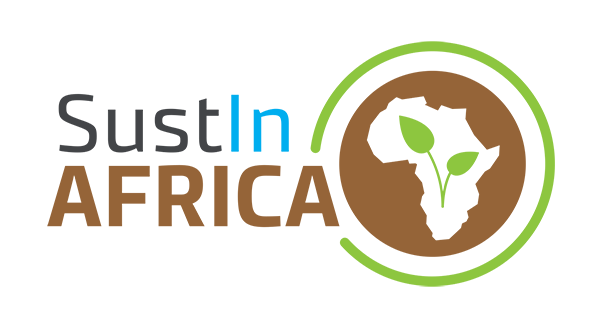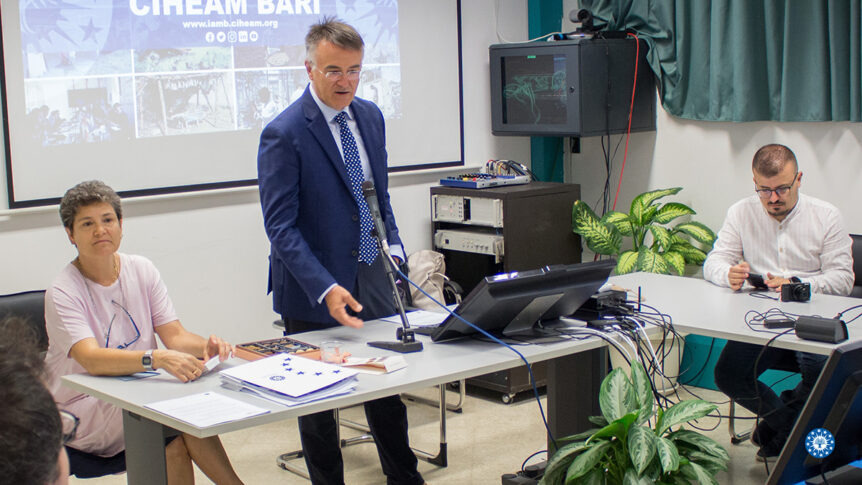SustInAfrica consortium gathered for its third annual meeting in Bari, Italy, during the first week of September. CIHEAM Bari hosted the 3-day meeting with participants from Italy, Germany, Austria, Ireland, Egypt, Portugal, Tunisia, Ghana and Finland. Participants from Niger and Burkina Faso attended the meeting remotely.
Before the meeting, SustInAfrica organized a publication workshop to provide the project’s scientists a focused space and time to work together on upcoming papers and to share ideas. After the meeting, a workshop on smart farming practices was also organized in Bari targeting the trainers working on field in the project’s five agro-ecological zones in Tunisia, Egypt, Ghana, Burkina Faso and Niger.
The consortium meeting’s opening remarks were heard from deputy director Biagio di Terlizzi from CIHEAM Bari, and Generosa J. Calabrese gave an introduction to the organization that aims to promote sustainable development of agriculture and improvement of food security in coastal and rural areas of the Mediterranean.

Data collection and verification and smart farming technologies
The first day of the meeting was dedicated to work packages 1 and 2. In the past year the work package 1 has analyzed ecosystem services, completed the baseline data collection, verified the collected data, organized workshops and interviews and analyzed the political, economical and societal setting in the research area. The survey data collection is about to be completed soon, and a report on data quality assessment will follow.
The challenges encountered include difficulties in data collection as due to security and political issues, field visits and data collection was limited in some communities. However, local partners aided in collecting data from stakeholders during the workshops. Perceived data quality is high but some topics need to be approached critically. The surveys have been also experienced to be too long and time consuming. The partners discussed how to tackle these problems and how to engage more young people in using the farming ICT services.
Work package 2 reported on progress in testing the readiness of various monitoring tools and hands-on testing of tech tools on olive, mango and pineapple crops in Tunisia and Ghana. The tests include measuring the chlorophyll content of olive leaves and olive three image assessment using an optical sensor. The WP2 also organised smart farming workshops in Tunisia and Ghana. During the workshops smart farming tools were approved and sensor tools implemented in field trials successfully.
WP2 has tested and adapted InsectaMon for monitoring pests. The tool has been tested for example in Jammal, Tunisia using traps for olive fruit moth and olive moth. WP2 has tested and developed remote sensing methods to evaluate soil decomposition rate, plant structures and plant nutrition status. WP2 has also used Landsat 2 time series data to create drought predictions.
Field trials, capacity building and communication
The second day of the meeting was dedicated to work packages 3, 4 and 6. Work package 3 reported on the field trials and data collection done in all five agro-ecological zones. The crops trialed include pigeon pea, cow pea, mucuna, bean, maize, pineapple, mango, cotton, olive and millet using agroecological practices such as intercopping, application of biochar, compost, inorganic NPK or biofertilizers, using mulch or no tillaging. From the trials data was collected on soil’s physio-chemical and biological properties, vegetative parameters, plant growth parameters, tree’s physiological parameters, insect diversity and the amount and quality of yield. The challenges encountered include high costs and inflation and unavailability of laboratory facilities in the research areas.
Work package 4 is in charge of the education and training approaches. WP 4 has created a training concept for SustInAfrica and a web-platform for education and training. Next steps of the WP4 are to define the academic training framework and a general training schedule for SustInAfrica. The partners discussed the need to start using the Farmerline (FL) Education & Training Web Platform efficiently. Work package leadership will change in the near future.
Work package 6 presented the communication activities from the past year. Focus of the work package is on boosting publications production that has started slow due to delays in field work and data collection. However, two publications have been submitted recently and the participants in the publication workshop earlier in the week have made good progress in boosting other publications down the pipeline.
Afternoon’s discussions’ theme was the creation of an academic framework for SustInAfrica. The dialogue with partners in Burkina Faso, Niger, Egypt and Tunisia will continue to assess and pursue possibilities in creating interdisciplinary academic courses for African academic institutions.
A stroll through medieval Bari and a lovely dinner at the Opera restaurant followed the second day’s activities. Lively discussion continued at the table enjoying the Puglian cuisine.

Wrapping up the meeting
On the final day it was time to look at the impact, replicability and exploitation of SustInAfrica’s results. Work package 5 is currently screening the project’s technologies for climate resilience, environmental and social impact. It is also evaluating the replicability potential for the innovations. The scoring of each technology is currently undergoing a validation process in collaboration with other work packages. The challenges identified and discussed during the WP5 pertained to delays in data collection.
The meeting was finished with the work package 7 team led by project coordinator Giles Young. WP7 instructed the partners on technical reporting. There was also a possibility to ask questions related to finance from senior specialist Timo Äikäs from Luke.
Thank you to the colleagues at CIHEAM Bari for hosting the meeting and providing excellent facilities for the multi-actor meeting!

